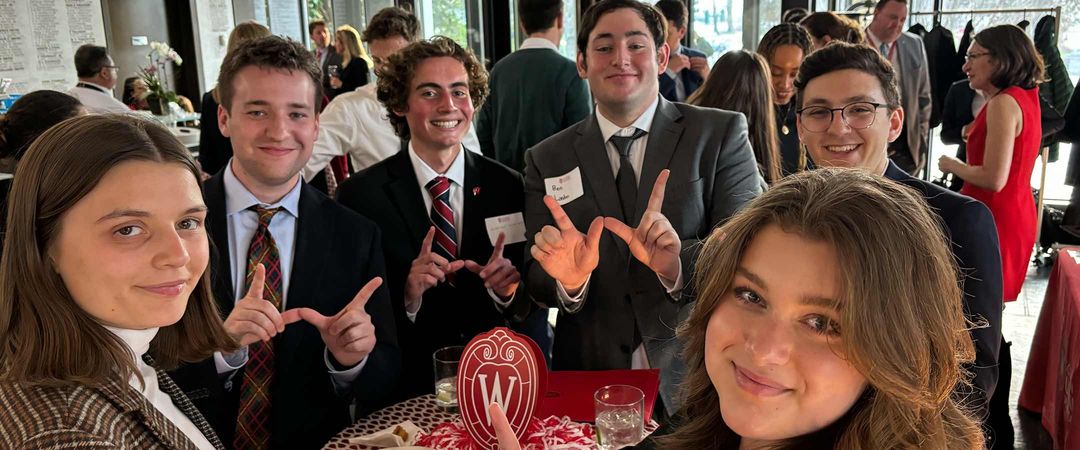Chemistry. It’s a basic part of education for many UW-Madison students, especially those who will take their degrees in science, technology, engineering and mathematics into an economy that increasingly depends on a STEM-prepared workforce.
Why Invest in the UW? Why Now?
- UW-Madison receives about the same amount of state dollars for educational programming today as it did in 2004.
- For proper funding levels, UW-Madison needs flexibility on non resident and professional school tuition.
- UW-Madison needs new state dollars to invest in faculty to provide high-demand programs and help meet Wisconsin’s workforce needs.
Chemistry is part of the core preparation for students studying nursing and engineering, which need more support for faculty to meet student demand. And in Wisconsin’s next state budget, the UW’s Department of Chemistry has a lot at stake in how well it can serve students and the state.
Alumni are digging into the details of the 2015-17 budget request from the University of Wisconsin System, and at this year’s Alumni for Wisconsin Fall Forum in November, they gained a better understanding of how the budget will impact the future of education and discovery at UW-Madison. (For the latest, see the Budget in Brief.)
Legislative action on the budget is expected earlier this year than in past budget cycles, said Chancellor Rebecca Blank, who stressed the impact alumni can have by sharing their early support for investing in the university by contacting Gov. Scott Walker and members of the state legislature.
Blank said that during the last year, her appreciation has grown for the size and scope of UW-Madison, and for the collaborations and breadth of opportunity it can provide students.
“I am firmly committed to the idea that, when it comes to being a first-rate university that excels in both education and research, bigger is better,” she said. “That, in turn, helps us recruit top faculty and students and provide them with a first-rate environment in which to do their work. All of this helps us create opportunities for our researchers to work in partnership with Wisconsin companies, and to produce highly educated graduates who are the future workforce for the state.”
Blank has asked campus leaders to examine models that show how teaching and research would be affected by budget cuts of 2%, 4% or 6%. Blank also expressed concerns about the continuing impacts of a tuition freeze, enacted in the last budget and expected to be extended for the next two years. It’s a particularly tough challenge, Blank said, especially following a year when the annual shortfall is expected to be $23.5 million.
Radio Spots
from University Communications
“Over the past year, we were able to absorb the impact of these cuts by spending down our fund balances to fund programs and services across campus, as the legislature directed,” she said. “But we can’t continue to fill budget gaps with fund balances, and we cannot cover ongoing costs with one-time dollars. At the end of this fiscal year, our tuition-fund balances will have declined almost by half, from 14 percent to 8 percent. We have little that can be labeled as true reserves. If we do not receive an increase in our educational funding, we will have to implement substantial cuts.”
Blank urged alumni to support the UW System’s request, which includes $95 million for new initiatives to support job growth and address high-demand majors, as well as a tuition freeze on resident undergraduate tuition.
Chemistry Professor Bob Hamers outlined how the request would support faculty in providing core courses in chemistry, where undergraduate enrollment has grown 78% in the last 25 years. Hamers also asked advocates to support the capital-budget request, which includes funds to renovate UW-Madison's chemistry building and bring labs up to modern standards that can meet the increased demand.
How can alumni advocates make a difference? It may seem small, but phone calls or notes of support for the university to elected officials can make a real impact.
“When alumni speak up about the importance of investing in this university, our collective voice can mean the difference in how well the UW can continue to do its part for Wisconsin,” said managing director Mike Fahey ’89, who leads Alumni for Wisconsin, WAA’s volunteer alumni-advocacy coalition.
Chancellor Blank noted the great influence that UW alumni and friends, the business community and others can have in advocating with elected officials and policymakers on the university’s behalf.
“Let them know what the university means to you, your business or your community,” she said. “As alumni, you know better than most the great things happening at UW-Madison, and the ways that impacts our state.”



